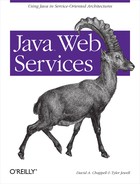Given the importance of interoperability to the future of web services, it shouldn’t be surprising that many other developers and corporations have created useful resources. In this section, we’ll look at a few of them. Simon Fell has developed a web site where developers can post their servers and clients. If a server implementation is updated, the notification service is called automatically and runs a registered test suite to verify interoperability. Registering for notifications when server or client updates are posted is also possible.
Several vendors, such as Iona, Borland, and HP, offer interoperability test facilities on their web sites. These sites provide client- and server-side implementations of the interoperability labs for testing. Iona also offers a site that features its daily build for interoperability testing.
Microsoft offers a SOAP 1.1 message validator to test interoperability (see Section 9.6). However, it is fairly limited and does not support encoding (either Section 5 or user-defined), external schema validation, or service description support.
Microsoft differentiates between conformance and validation and offers this tool as a SOAP message validation tool. In contrast, a conformant SOAP message “does not violate any of the sections in its specification, and therefore ensures the highest degree of interoperability with vendor implementations that also conform to the same standard specification.”
Microsoft also offers a SOAP Interop server site (see Section 9.6). It provides test services for ASP.Net, .NET remoting, Microsoft SOAP Toolkit Version 2 and Version 3, and results for interoperability testing between Microsoft SOAP Toolkit Version 2, ASP.Net and other environments such as Apache 2.2 and Axis, SOAPLite, and IONA.
The W3C XML Protocol Working Group is developing a test collection to verify implementation compliance to the SOAP 1.2 specification. The latest draft is dated November 16, 2001. The test collection summarizes “testable assertions” from the specification, and the tests are intended to determine whether a SOAP processor implemented each assertion. The test suite includes tests for the core specification, encoding, RPC, and HTTP binding. How the assertions are tested varies. For example, the first assertion (A1), which is part of the Core specification tests, is:
A SOAP node receiving a SOAP message MUST perform processing according to the SOAP processing model and, if appropriate, generate SOAP Faults, SOAP responses and send additional SOAP messages, as provided by the remainder of this specification.
A specific test is not provided for this assertion because it is tested by the entire test suite.In other cases, specific tests are provided for the assertion. Assertion A2, also part of Core, states that:
Each SOAP node MUST act in the role of the special SOAP actor named “http://www.w3.org/2001/09/soap-envelope/actor/next” and can additionally assume the roles of zero or more other SOAP actors.
Two tests are provided for this assertion.
The W3C has not determined which parts of the SOAP 1.2 specification are mandatory and must be supported for an implementation to claim compliance. For example, support for SOAP encoding could become optional, so an implementation not supporting it could still be considered compliant with the specification. Compliance, or performing successfully against the test suite, is not considered W3C certification for an implementation.
Xmethods maintains a list of web services and SOAP implementations. It provides a mechanism to register new services and manage services that are listed. It also offers a new service notification subscription, which notifies the subscriber whenever a new service is added to the site. Xmethods coordinated Round 1 of the SOAPBuilders Interoperability Test Lab.
SalCentral is a web services brokerage that advertises itself as “the Napster of web services” and “the world’s largest brokerage for schemas, reviews and quality assurance information on web services.” SalCentrals offer a free service called “Web Services Watch” that notifies the subscriber if a predefined event occurs. One example is a change to the schema or service details. Independent testing for web services is also provided through a Test Lab, which includes interoperability testing across several SOAP toolkits (including .NET).
Lucin Corporation, an Internet development company, maintains SalCentral. The site also coordinates a community mailing list for the exchange of information regarding XML Schema-defined web services.
